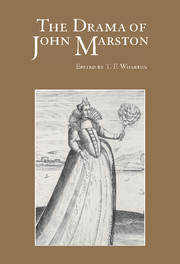Book contents
- Frontmatter
- Contents
- Notes on contributors
- Acknowledgements
- Note on the text
- Introduction
- 1 John Marston at the ‘mart of woe’: the Antonio plays
- 2 John Marston: a theatrical perspective
- 3 Varieties of fantasy in What You Will
- 4 Safety in fiction: Marston's recreational poetics
- 5 Insatiate punning in Marston's courtesan plays
- 6 Touching the self: masturbatory Marston
- 7 ‘Two parts in one’: Marston and masculinity
- 8 The Malcontent: hunting the letter
- 9 The Dutch Courtesan and the profits of translation
- 10 Sexual politics in Marston's The Malcontent
- 11 Marston: censure, censorship, and free speech
- 12 Ill-mannered Marston
- Index
4 - Safety in fiction: Marston's recreational poetics
Published online by Cambridge University Press: 01 October 2009
- Frontmatter
- Contents
- Notes on contributors
- Acknowledgements
- Note on the text
- Introduction
- 1 John Marston at the ‘mart of woe’: the Antonio plays
- 2 John Marston: a theatrical perspective
- 3 Varieties of fantasy in What You Will
- 4 Safety in fiction: Marston's recreational poetics
- 5 Insatiate punning in Marston's courtesan plays
- 6 Touching the self: masturbatory Marston
- 7 ‘Two parts in one’: Marston and masculinity
- 8 The Malcontent: hunting the letter
- 9 The Dutch Courtesan and the profits of translation
- 10 Sexual politics in Marston's The Malcontent
- 11 Marston: censure, censorship, and free speech
- 12 Ill-mannered Marston
- Index
Summary
The London of the late 1590s and early 1600s was a place in which satiric writing, whether for publication or for the stage, was anything but a safe pursuit. The death of Burghley in 1598, Elizabeth's increasing infirmity, and the Essex Rebellion of 1601 were just some of the factors motivating the government's heightened intolerance of public criticism of its institutions or policies. Nashe's imprisonment for his part in the Isle of Dogs, banned and suppressed after one performance in 1597, and the prosecution in 1605 of Jonson and Chapman (Marston escaped unpunished) for their part in the writing of Eastward Ho, might be taken as chronological boundary markers for this turn-of-the-century burst of political sensitivity. At its midpoint we find Elizabeth's famous (and astute) remark on the performances of Shakespeare's Richard II mounted by Essex supporters in the weeks prior to the Rebellion (‘I am Richard the Second, know ye not that?’); and by the ‘Bishops' Bonfire’ of the previous year (1599), in which several recently published books were banned, for some-what obscure reasons, and copies of them seized from the booksellers and burned in the churchyard of Paul's by episcopal decree.
Among the items destroyed in that unusually dramatic act of suppression were Marston's two collections of verse satires, Certaine Satyres and The Scourge of Villanie (both 1598) and his verse epyllion, The Metamorphosis of Pigmalion's Image, written in the manner of Venus and Adonis and Hero and Leander (both of which were also burned).
- Type
- Chapter
- Information
- The Drama of John MarstonCritical Re-Visions, pp. 60 - 81Publisher: Cambridge University PressPrint publication year: 2001

